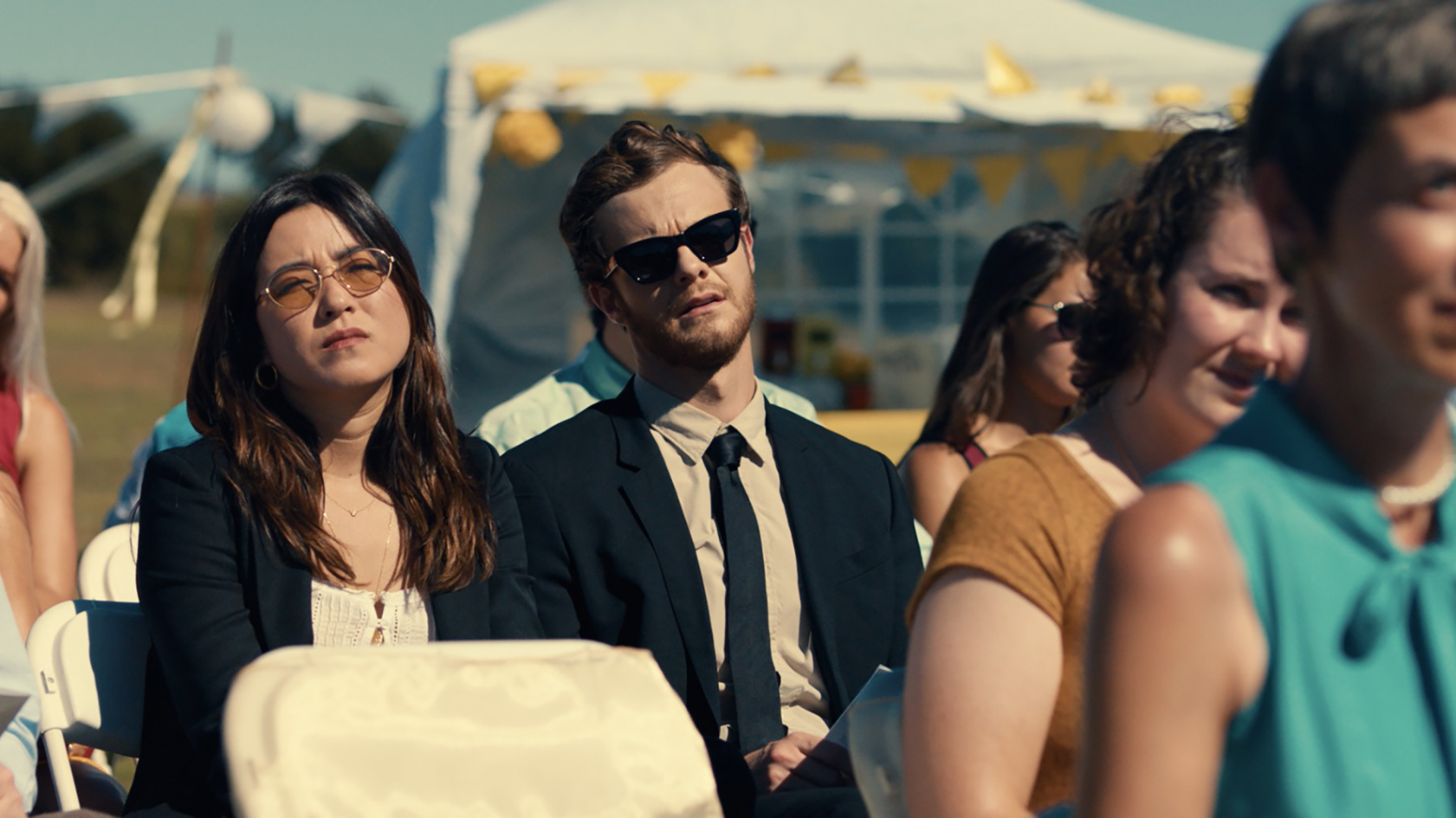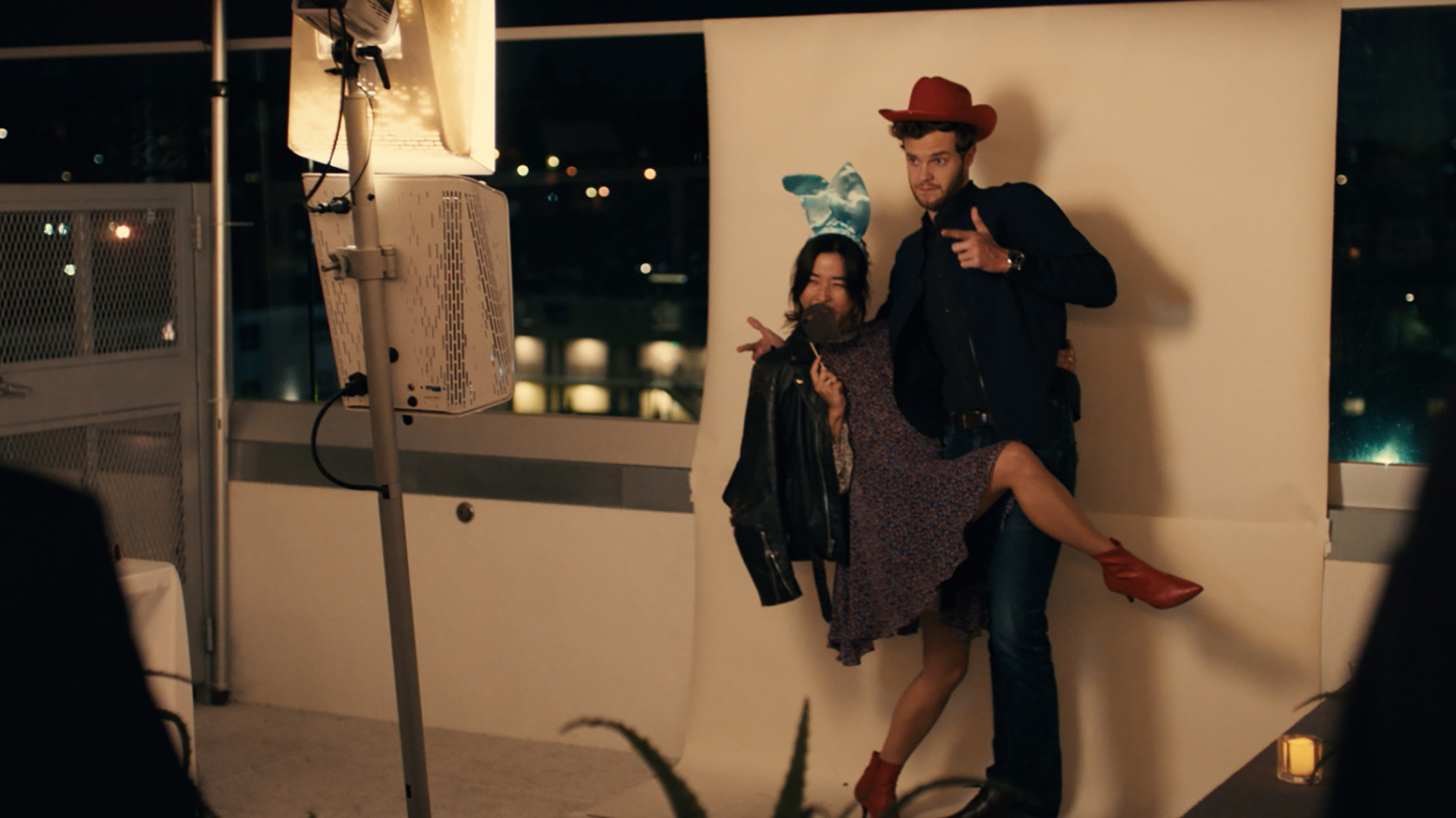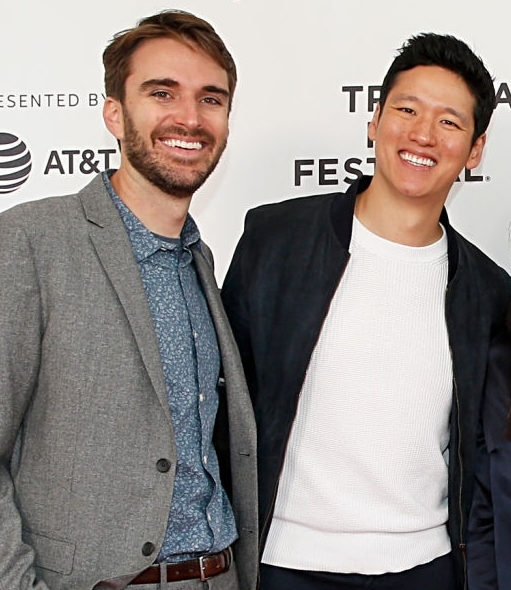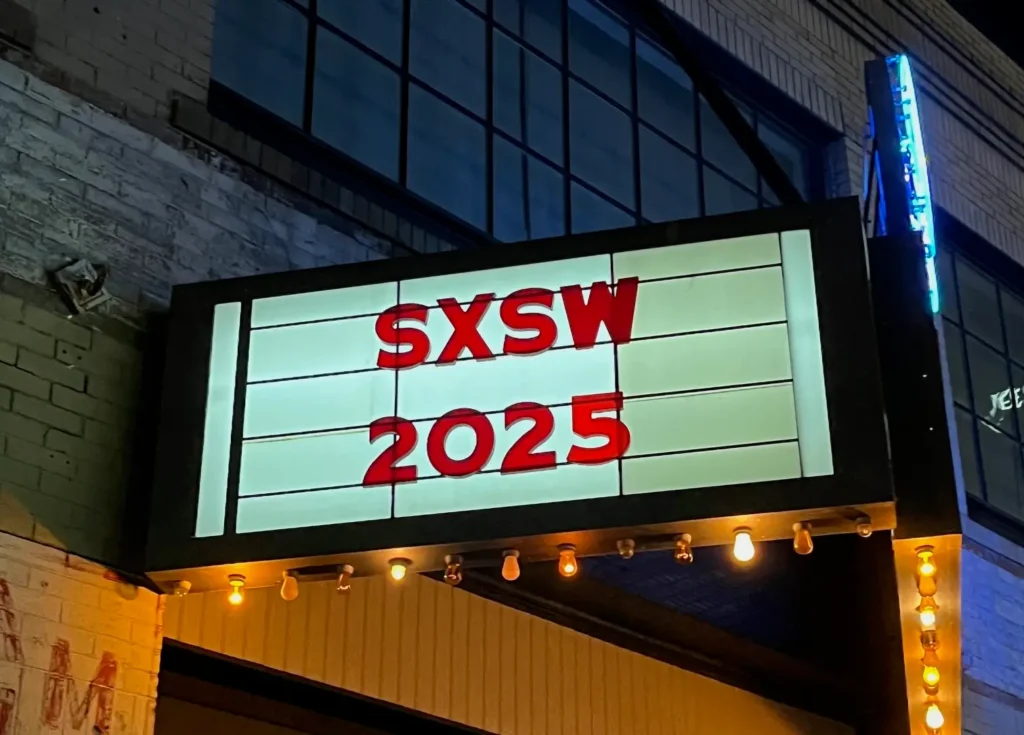Like a great rom-com pairing, a creative professional partnership is about two people finding their match and saying, “You complete me… in a creative and professional sense.” Lucky for JEFF CHAN and ANDREW RHYMER, they found their collaborative match early on, back during their freshman year of film school. Since graduating from NYU, the pair has written and directed short films (two of which, the single-take Pregame and Post-Party, achieved viral success) and written for the Hulu series Pen15. Separately, Rhymer produced the web series Next Time on Lonny and Chan directed episodes of Adam Ruins Everything. But their most recent collaboration has taken their partnership to a new level: the release of their feature film debut as writer/directors, the award-winning romantic comedy PLUS ONE.
Taking place over the course of ten weddings, Plus One finds Maya Erskine and Jack Quaid as two best friends who agree to tackle the endless rounds of nuptials together as dates/wingmen. Joining the pair is a vast ensemble cast including Beck Bennett, Rosalind Chao, Finn Wittrock, Anna Konkle, Perrey Reeves, and Ed Begley, Jr. Executive produced by Ben Stiller, the film premiered at the 2019 Tribeca Film Festival, where it took home the Audience Award for Best Narrative Film. RLJE Films will release Plus One in theaters, VOD, and Digital HD on June 14.
Jeff Chan and Andrew Rhymer were kind enough to talk with us recently about their collaborative approach to screenwriting, casting, and more about the making of Plus One.
——

COLIN McCORMACK: You guys started collaborating back in college, correct?
ANDREW RHYMER: Yeah, Jeff and I actually met in college. We went to NYU together and started making short films very early on freshman year. Then we’ve mostly worked in each others’ orbits ever since.
CM: How has that on-set dynamic evolved as your projects have grown? Is it pretty much the same as when you started out or have you realized strengths and weaknesses and let it ebb and flow?
JEFF CHAN: It’s definitely evolved over time. I think in film school, you don’t really know what your strengths and weaknesses are yet. You don’t really know how you collaborate. Your friends are also your crewmembers and there’s a lot of trial by fire in film school, which is great if you keep working together after you graduate. You sort of hone that dynamic and figure out how you work best together. I like to say that Andrew looks at the world through a telescope and I look at the world through a microscope. I can be very microscopic in trying to figure things out. Like, “How do we synthesize water?” And Rhymer will be standing next to me and he’ll just go, “There’s a planet over there with water on it.” Like, Oh yeah, that makes sense. He takes a nice zoomed-out perspective, where I can be very granular sometimes. It’s taken us a little while to figure that out, but once we did it created a really comfortable environment. I don’t think there was a single blowup on set, which is the best you can ask for when you’re co-directing something.
CM: Had you experienced a co-directing team working on other sets before to see how other teams might work when cameras are rolling?
AR: I don’t think we’ve worked with a lot of specific co-directing teams but I do think the way we approached every conversation, and continue to, is a way that grows out of the collaboration from film school. Just really working together to figure out the project and playing to various peoples’ strengths. We haven’t necessarily worked with a lot of co-directors, but we’ve worked with a lot of people who are co-creators of TV shows or co-writers. Really, we came up working and doing this swap onto each other’s sets, I’ll AD for you and you direct for me, all that kind of stuff. I think when we first started out, our first attempt at making something together, we totally thought, We’ll be like one of those brother duos! And the first thing to figure out was we’re really not the same brain with the same feeling about everything. So figuring out that flow and where the strengths are has been a constantly evolving process. Every day is a new problem, from writing a script through post-production and trying to market a movie. Constantly figuring out how to attack that together is pretty much every day.
CM: In the writing process, are you guys a both-in-the-same-room writing team or does one takes a crack, sends it to the other one, then they take a crack?
JC: We wrote pretty much this entire movie via DropBox account across the country from each other. I was in New York at the time and Rhymer was in L.A. We were relying on Final Draft “Revisions Mode” to keep track of who was writing what. We like to do this sort of leapfrog approach where someone will write three new pages, and then the next person will revise those three pages and then add three new ones, then the last guy will revise those three pages and add three new ones. It’s sort of a leapfrog approach that I think really works for us, where you’re kind of exercising both sides of your brain- the one that’s generating new scenes and the one that’s editing and figuring out what they like and what they might want to change. We did that for I’d say 90% of the writing process. Then, when we’d come to a point that felt like a draft was in really good shape, the two of us would get into the same room, put it up on a TV via Apple TV, then just go through it line by line and make sure we were both really happy with what was written.
CM: You had a short called Pregame that sort of went viral. What were the results of that attention on your careers? Is there a direct line of success you trace back to that short?
AR: It absolutely had a big effect. It’s sort of funny, we made that movie in a somewhat depressed period. We’d been trying to make Plus One for a few years and we had what we thought was our shot and – as it often happens in lots of indie filmmaking and filmmaking in general – the financing blew up. We lost everything. Jeff had moved to L.A. from New York to make our first movie together and we thought we had this big opportunity, then we had this bad luck and things blew up. So we were back making some commercials and we had some gear and one of our producers we work with a ton just put it together to make this short over a weekend when we had an allotment of gear. We got a bunch of our friends together; it was kind of made in that spirit, so the fact that it took off was great. Then yes, that was directly how the company Studio71 ended up coming to essentially rescue Plus One from development purgatory. One of their development people saw the short and called us in for a general about a different project. We wound up also talking about Plus One as this movie that had kind of gotten away, then two weeks later they called and said, “We want to make this movie with you.” And four months after that, we were shooting. So that was a pretty wild and unexpected experience for us, for sure.
CM: In terms of the Plus One cast, there’s a lot of overlap of actors who have worked on your shorts, so I was curious since you cast a lot of friends and frequent collaborators, did you also go through a traditional casting process?
JC: For the shorts, it was entirely just casting our friends. A lot of those people are people we went to NYU with or friends of friends that we’ve grown close to over time. When it came time to doing Plus One, there were just so many speaking roles that we did go through a casting director.
AR: Shoutout to Lindsey Weissmueller and Neely Eisenstein.
JC: What we did was we created this huge Google Drive document that we shared between Andrew and I and the two casting directors. We had every single speaking role on it, and then next to it, if there was a friend we knew we wanted to cast we put their name in, then we would color-code everything. So green was someone we knew we were going to be making a simple friendship offer to; then I think yellow was people we wanted to make offers to who we weren’t friends with, so maybe a name actor or someone we’d seen on a different show or a movie that we wanted for the role; then in red were the people we had no clue who could play it that we would need to read for. So that helped us wrap our brains around casting all of these roles because there’s so many that at first, it was really scary. But once we narrowed it down like, Okay, we know Jon Bass is going to play Cartelli, we know Patrick Woodall is going to play this character, these are all friends of ours who had been in Pregame and Post-Party. We were able to narrow things down to only really reading for 15 roles. Then we’re making offers to another 20 actors, and then we’re going from there. It helped us simplify the whole process.
CM: Were the lead roles written for Maya and Jack?
AR: They weren’t, but only because Jeff and I started writing this movie in 2014, I believe, so this has been a long road. Starting when we were writing these roles, they were imagined versions of people we might know or people who shared common traits with various friends. We just wanted to make it feel real and make them feel like people we know and could relate to and it started to evolve from there. We spent a long time finding actors. The movie went through several phases of coming together and falling apart and when we found Studio71 and were barreling downhill toward production we really accelerated the search for people. Maya we obviously had known from school and we’d worked with her on our short films. Jack we had quite a few people we knew in common and he also went to school a few years after us. Once we met with them and saw them, we knew they were fantastic and great. But it was certainly a very extensive process, both with our producers making sure we had the right people because everything about this movie does hang on those two roles, creative, the marketing, all that kind of stuff. So there were a bajillion conversations thinking about it every which way. But they were absolutely the best people for it and we were so lucky and glad and grateful that we got to work with them on it.
CM: What was your shoot schedule like?
AR: We had a 25-day shoot, so it was five weeks, which I feel like is in some ways an incredibly short amount of time and in some ways – considering we were a small indie film – an incredibly long amount of time. But it was great, we had one of the best producers in the world helping us plan everything. Well, we had a lot of the best producers in the world, but one of them that really masterminded the production schedule is our producer Jeremy Reitz, who with the whole team made it so this very small movie with not a ton of resources was able to feel as much like a big fun wedding world as we could put on screen.
CM: In terms of the producing and that organization – and I see how organized you guys were in your casting process – what was it like filming and differentiating those weddings? When you have to film ten plus unique weddings with their own location and look and vibe, what was that process like?
JC: The process was being as clever as possible in the location scout phase. So any time we were location scouting we really wanted to make sure that a place could work for specific scenes but also double or even triple as other wedding spaces. So the country club where we filmed the scene where they jump in the pool together was also the lodge lobby where they meet Finn Wittrock as the strange concierge, and also it tripled as the final wedding, Ben’s dad’s wedding. Any time we went on a scout we were really scouring the entire space to see, How many different locations could we use this for? So when we were shooting, instead of just coming in to do one or two scenes, we were spending a couple of days here and shooting a bunch of different sequences or pieces of different sequences. It really helped us maximize efficiency so the crew doesn’t have to break down all their gear and get it back to a truck and go to the next location. If you can spend at least two days somewhere, you’re already helping yourself out in a huge way.
CM: To wrap up, what’s next for you guys?
AR: We are developing several things right now. We don’t have our next “announceable” thing yet, but we’re working on a few new feature scripts and we’re developing a TV show. We’re also doing some projects separately that are things that have been keeping us up at night for years. So yeah, we’re figuring out what’s next but very excited to get this movie out into the world and keep going.

__
Thanks to Andrew and Jeff for taking the time to talk with us about PLUS ONE.
If you’re an independent filmmaker or know of an independent film-related topic we should write about, email blogadmin@sagindie.org for consideration.



